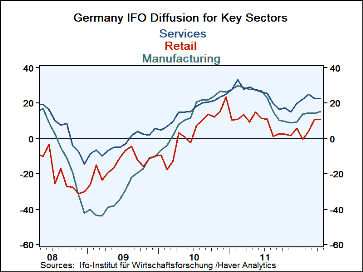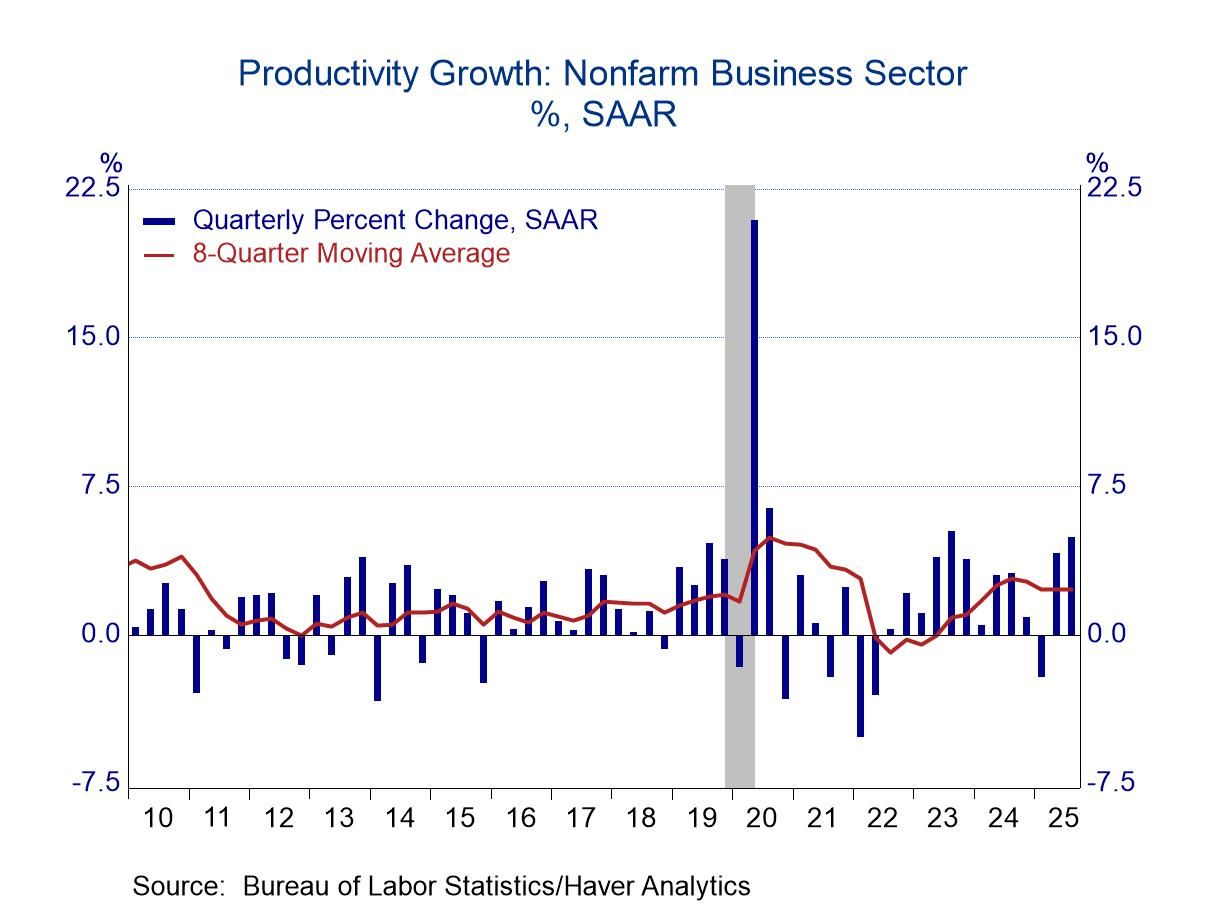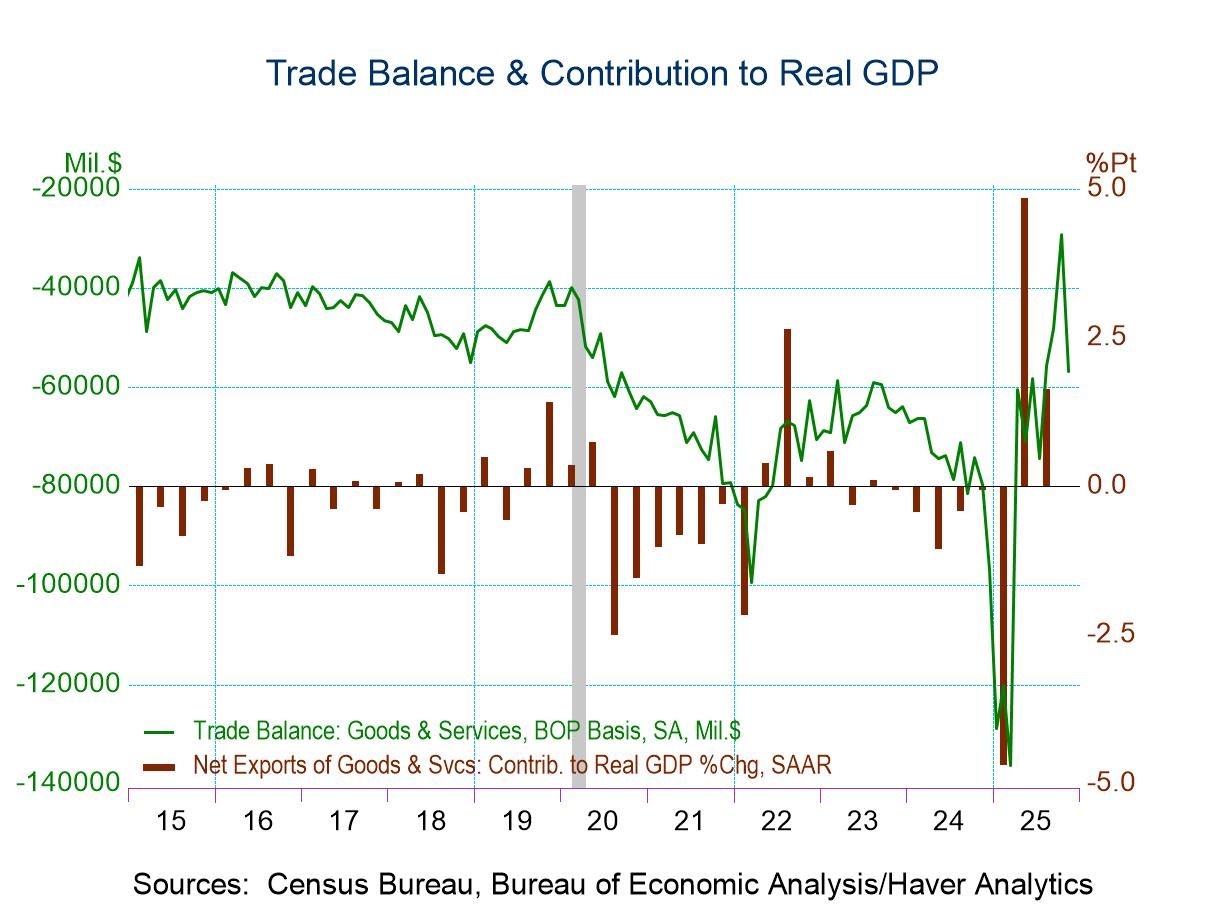 Global| Apr 20 2012
Global| Apr 20 2012Has Germany Dodged The Bullet?
Summary
The sector array of up-minus-down diffusion readings shows only one negative sector for Germany in April. And this is with a new crisis swirling around the Euro Area. The far right column arrays the readings in the table Vs their [...]
 The sector array of up-minus-down diffusion readings shows only one negative sector for Germany in April.
And this is with a new crisis swirling around the Euro Area.
The sector array of up-minus-down diffusion readings shows only one negative sector for Germany in April.
And this is with a new crisis swirling around the Euro Area.
The far right column arrays the readings in the table Vs their historic results. The expectations reading is above its midpoint standing in the 66th percentile of its range (higher than this only one-third of the time). So that is not a bad reading at all. But it is not as strong as the current reading which is positioned in the 93rd percentile of its queue (higher only 7% of the time) and the climate index that stands in the 88th percentile of this queue.
Despite peeling back into negative territory the construction index is still the relative strongest index this month followed closely by retailing, wholesaling, services, with manufacturing last.
Typically in a recovery period when the manufacturing sector begins to weaken from its cycle peak retailing does not stay strong, but that unusual development is still in train in this cycle as retailing has remained elevated. So we are not really sure how to think of the current German economy because it is doing something different from what it usually does. It could be that manufacturing weakness is temporary and Germany will weather the storm around it allowing the retail sector to remain vibrant. The manufacturing sector which led the way higher in this expansion after the financial crisis has since fallen off and now has a mini revival in place and we can't yet tell if it will continue that revival and underpin retailing or if the Zone's problems will drag German back into the abyss.
This result is not predetermined. Troubles of the Euro Area are still with us. I think the Euro Area troubles are too severe to fix but that belief, unfortunately, does not make the next step very clear. Until we can figure out how Europe will resolve its differences it is hard to tell how the various economies will react.
For now Germany is still strapped into the Euro Area and that gives it a special competitiveness position but of course it is selling its highly competitive products into a very weak market. Germany is still at risk as a nation as the Bundesbank owns up to a large portion of the liabilities of the ECB and it is unclear how that will play out. But any ECB schemes such as LTRO that weaken the ECB balance sheet have negative repercussions for Germany and there is sure to be more of a backlash over this as conditions in the Zone worsen, as they must.
The IFO serves to paint a generally stronger picture of Germany than the PMI readings for MFG and Services from Markit. In that scheme, where we have data through March, German MFG and Services sectors are shrinking.
There is no clarity about growth for the moment. The zone is under pressure. This weekend the French elections will settle things and it is potentially a huge election for the Zone. For now there is little reason for optimism on Zone affairs. Germany has the best chance of emerging from this euro-morass in the least bad shape of all. And that is all the more positive I am willing to be. Trying to say how the Euro Area will turn out is like trying to say who will be the 4rd round draft pick of Dallas Cowboys in the upcoming NFL draft. There are too many moving parts and changing elements ahead of that pick to make such a guess worthwhile. The same is true of developments in the Euro Area.
12 Mar
12 Avg Median Max Min Range %
Range Q or
Rank
Robert Brusca
AuthorMore in Author Profile »Robert A. Brusca is Chief Economist of Fact and Opinion Economics, a consulting firm he founded in Manhattan. He has been an economist on Wall Street for over 25 years. He has visited central banking and large institutional clients in over 30 countries in his career as an economist. Mr. Brusca was a Divisional Research Chief at the Federal Reserve Bank of NY (Chief of the International Financial markets Division), a Fed Watcher at Irving Trust and Chief Economist at Nikko Securities International. He is widely quoted and appears in various media. Mr. Brusca holds an MA and Ph.D. in economics from Michigan State University and a BA in Economics from the University of Michigan. His research pursues his strong interests in non aligned policy economics as well as international economics. FAO Economics’ research targets investors to assist them in making better investment decisions in stocks, bonds and in a variety of international assets. The company does not manage money and has no conflicts in giving economic advice.






